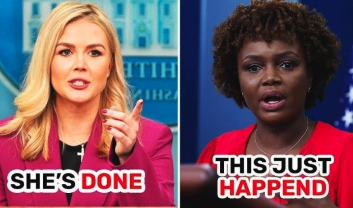Karoline Leavitt Pushes Back on CNN Over Elon Musk’s Security Clearance Questions
White House Press Secretary Defends Administration’s Vetting Process, Sparks Broader Debate Over Transparency and Innovation in Government
In a tense and closely watched White House press briefing, Press Secretary Karoline Leavitt delivered a sharp rebuke to CNN’s Kaitlan Collins, who pressed for details on Elon Musk’s security clearance and his official role as a special government employee. The exchange quickly evolved beyond routine questioning, capturing the growing tension between the media’s demand for transparency and the administration’s effort to protect sensitive national security processes.
The Flashpoint: Musk’s Federal Role Under Scrutiny
The briefing began as a standard policy update, with senior officials such as Middle East envoy Steve Witkoff and National Security Advisor Michael Waltz in attendance. However, it took a more confrontational turn when Collins directly challenged Leavitt over Musk’s appointment within the Department of Government Efficiency (DOGE).
“Can you confirm that Elon Musk is a special government employee? And what kind of security clearance does he have?” Collins asked pointedly, framing the question around public concerns about Musk’s growing influence within federal operations.
Leavitt, maintaining her composure, confirmed Musk’s position but stopped short of detailing his clearance level. “I can confirm he’s a special government employee,” she said. “And he’s in full compliance with federal law.”
When Collins pressed further, Leavitt refused to elaborate, emphasizing that while she did not have the precise details on hand, all procedures had been followed correctly. Her deliberate brevity underscored the administration’s confidence in its internal protocols while signaling its unwillingness to feed speculation.
Musk’s Appointment: Innovation Meets Government Oversight
Elon Musk’s designation as a Special Government Employee represents a growing trend of integrating private-sector leaders into public service roles. His position within DOGE — an agency tasked with streamlining bureaucracy and eliminating wasteful spending — highlights the Trump administration’s drive to bring business efficiency into federal governance.
Supporters argue Musk’s involvement could revolutionize outdated systems, while critics question the wisdom of granting high-level access to someone with deep private-sector and international ties. Leavitt’s insistence on legal compliance aimed to quell doubts but, for some, left lingering questions about transparency.
The Larger Debate: Transparency Versus National Security
At the heart of the exchange lies a familiar dilemma — how much information about government vetting should be made public?
Advocates for openness argue that transparency fosters trust, while national security experts warn that revealing clearance specifics could compromise operations or create vulnerabilities.
Leavitt’s cautious tone reflected this balance. By neither confirming nor denying details beyond Musk’s compliance, she reinforced the administration’s position that certain matters must remain confidential to safeguard national interests.
Political Dynamics and Media Motives
Collins’ line of questioning reflects broader media scrutiny surrounding unconventional federal appointments. Critics of the administration view Musk’s government role as evidence of blurred lines between public service and private enterprise. Supporters, however, saw Leavitt’s measured defense as evidence of professionalism under pressure.
Political analysts were quick to weigh in. Some praised Leavitt’s discipline, noting that her refusal to engage in speculation demonstrated strength and message control. Others suggested that the administration’s lack of transparency could fuel unnecessary suspicion.
The Vetting Process in the Age of Outsiders
The controversy underscores a larger transformation in federal hiring. As Washington increasingly turns to business innovators and technologists for reform, the traditional vetting process faces new challenges. Figures like Musk — who straddle the line between entrepreneur and policy influencer — raise questions about how far the government can or should go in adapting its standards.
With cybersecurity threats and international conflicts growing more complex, critics argue that even minor lapses in clearance could carry major risks. Leavitt, however, maintained that Musk’s appointment adhered fully to existing legal and ethical standards.
Media, Accountability, and Political Theater
The Leavitt–Collins exchange also reignited debate about the role of the press. Some saw Collins’ aggressive questioning as legitimate accountability journalism; others viewed it as political theater intended to generate controversy rather than clarity.
In a polarized media environment, such moments have become emblematic of how transparency itself can be weaponized — either as a tool of oversight or as a cudgel against political opponents.
A New Era of Governance
Ultimately, the episode represents more than a debate about one man’s clearance. It encapsulates the evolving relationship between government innovation, public trust, and the role of the media in shaping both.
The Trump administration has reiterated its commitment to rigorous vetting and oversight, while continuing to court figures like Musk who promise to “disrupt” government inefficiency. Whether that approach fosters progress or peril remains an open question.
Conclusion: The Collision of Accountability and Disruption
Karoline Leavitt’s exchange with Kaitlan Collins marked a defining moment in the administration’s approach to public communication. By standing firm on Musk’s compliance while withholding sensitive details, Leavitt underscored a central tension in modern governance — the need to balance innovation with institutional integrity.
As scrutiny intensifies, Musk’s role will remain a flashpoint for broader questions about how Washington manages its collaboration with powerful outsiders. One thing is clear: in the new age of government transparency and disruption, the lines between public accountability and political spectacle have never been thinner.

